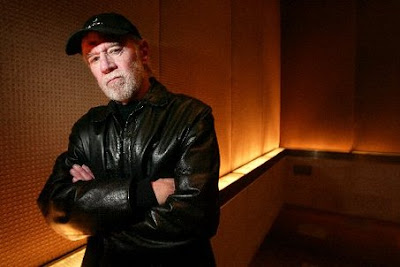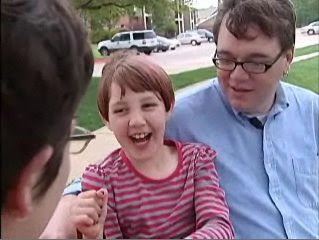I gave the keynote address at the 2008 Assistive Technology Cluster Conference in Richardson, Texas last week. This is something that has been in the works for a while, and I was excited about it, in a "they want me to speak for how long?" sort of way. Excited, with a "good thing a wore my brown pants" element of terror mixed in.
I don't want to sound like I am tooting my own horn here, but honestly, I think it went really well. They laughed at my jokes (Looking for an easy laugh when talking to special educators? Make fun of No Child Left Behind...), almost no one left while I was talking, no one booed or threw anything at me, and when it was over, some of the people who came up to talk to me had been crying. There's nothing like seeing someone's runny mascara to make you feel like you got it right as a writer. I was more concerned about my delivery than the actual text, but I got through it without stammering too much or dropping any random F-bombs, so all in all, I'm pleased with how it went. Perhaps I'll put it online.
(Edited to add: Done.)
As is usual with this book and the appearances we've made, however, the real star was Schuyler. I put together a PowerPoint presentation (actually, on Apple's very cool Keynote software; imagine Powerpoint's hotter, sluttier sister) that was heavy on the Schuyler images, and that was a wise, if not particularly unexpected, move on my part. When I mentioned Schuyler's ability to communicate her defiance without words, the image on the three big screens got what was probably the best reaction of the whole speech. As hard as I work to represent her in my writing and in my advocacy, Schuyler speaks for herself best of all.
When my speech was over, the organizer of the conference invited Schuyler to come up to the front. In this huge room full of adults, Schuyler looked tiny and fragile to me, but she strode to the front without hesitation in her little black dress and newly-reddened hair, took the microphone and said, with confidence and almost comprehensibly, "Hi everyone!"
And THAT, my friends, was the best part of my keynote address.
The conference itself was fantastic, and very eye-opening for us. They gave us a table in the too-small exhibitors' hall, where we signed books and met teachers and parents and, most importantly, other people who were using assistive technology like Schuyler's Big Box of Words. These were young people with disabilities much more severe than Schuyler's, to the point that they had to struggle many times just to put their words in order. And yet, I don't think I can adequately describe how powerfully affecting it was to watch them navigate on their devices and communicate in full sentences, with complexity and nuance and humor. It gave me, and Schuyler most of all, a lot to consider where her own device usage is concerned.
One of the most fascinating parts of the conference for us was seeing exactly how much work is being done by some very smart people to advance the technology that kids like Schuyler are using. Prentke Romich, makers of the Big Box of Words, were well-represented, as usual. I'm always amazed at the people who work for that company, not just by how smart and committed they are to their work, but also just by the humor and confidence they exude. Two of their reps were device users themselves, and they were kind enough to come talk to Schuyler from time to time on their devices. You can probably imagine how weepy I became, on more than one occasion.
There were other companies represented, and a lot of very innovative technology on display. I came away with a lot of ideas and thoughts, some of which I'm going to share with PRC soon. The whole thing made me think about this in whole new ways.
But most of all, the thing I took away from this conference was an appreciation for the work that all these people are doing. Teachers, therapists, administrators, parents, advocates, all of them. When I looked out at that audience, the thing I felt most of all was humbled (and how often does THAT happen?). I was standing in front of the people who have made it their life's work to help kids like Schuyler.
Early in my speech, I said:
It might be the most striking difference between our experience with the world of broken children and yours. As special educators and experts in assistive technology, you have sought out the monsters. You’ve armed yourselves with the knowledge and the tools to fight them, and you’ve gone into battle with your armor in place. For parents, the monsters have found us, in most cases sitting by the campfire in ignorant bliss, totally unprepared.
There’s a transition that special needs parents go through, and it’s one that I suspect never completes itself entirely. We go from seeing sad stories about kids with disabilities on television and saying "I can’t even begin to imagine how those parents deal with that" to becoming the parents who face it with our kids and for our kids. We learn quickly to conceal our fear, which is very great, and our self-doubts, which are many. We take hold of whatever we need in order to find that extra strength, whether it’s God or friends and family or a good stiff drink, and we draw our rubber swords. When we get to the battlefield, we find… you. You’re already there, our generals and our scouts, and you know the lay of the land. We’re not ready when we get there, not quite, but we will be soon enough. Once we get past our denial and our mourning for the child we always thought we’d have, we devote ourselves to the complicated, broken but equally wonderful child in its place. No one in the world is a quicker study than the special needs parent.
I've learned so much over the past few years, most of it about myself and my own capabilities, and all of it from Schuyler. Being there in front of those amazing people and being able to share my perspective with them was one of the singular honors of my life. And that's the truth.









